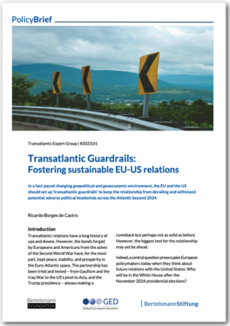Transatlantic relations have a long history of ups and downs. However, the bonds forged by Europeans and Americans from the ashes of the Second World War have, for the most part, kept peace, stability, and prosperity in the Euro-Atlantic space. The partnership has been tried and tested – from Gaullism and the Iraq War to the US’s pivot to Asia and the Trump presidency – always making a comeback but perhaps not as solid as before. However, the biggest test for the relationship may yet be ahead. Indeed, a central question preoccupies European policymakers today when they think about future relations with the United States: Who will be in the White House after the November 2024 presidential elections?
There are legitimate concerns about what a re-election of Donald Trump or of a Trumpian president could mean for transatlantic relations, while also considering that despite “America is back,” as President Biden put it at the start of his term, transatlantic relations have been bumpy over the last few years.
This worry becomes even more salient at a moment when Russia’s war of aggression on Ukraine still rages with clear implications for Europe’s future security architecture; China continues to be a contentious issue across the Atlantic; the differences related to economic security, trade and tech seem to pileup; climate and energy transitions emerge as friction points; and there is a lack of a concerted approach towards the so-called ‘global south.’
Against this backdrop, the EU and the US should set up ‘transatlantic guardrails’ to keep the bilateral relationship from potentially derailing and capable to withstand adverse future political headwinds. In other words, both sides should promote ways to mitigate potential emerging problems and adopt formal and informal mechanisms to keep relations on track.
Future developments in domestic politics in Brussels and Washington could, however, spell trouble. Indeed, as 2023 draws to a close, political attention in Brussels and Washington will gradually shift to the European Parliament elections in June 2024, as well as the US presidential and congressional elections in November 2024, which are preceded by primaries for the Democratic and Republican parties from January to the summer of 2024. With President Biden in the White House and President von der Leyen in the European Commission, the EU and the US have a window of opportunity to setup what can be termed ‘transatlantic guardrails’ to keep the relationship stable should political winds change in 2024.
This policy brief is a publication of the Transatlantic Expert Group set up by the Bertelsmann Stiftung and the Bertelsmann Foundation in Washington, D.C.







